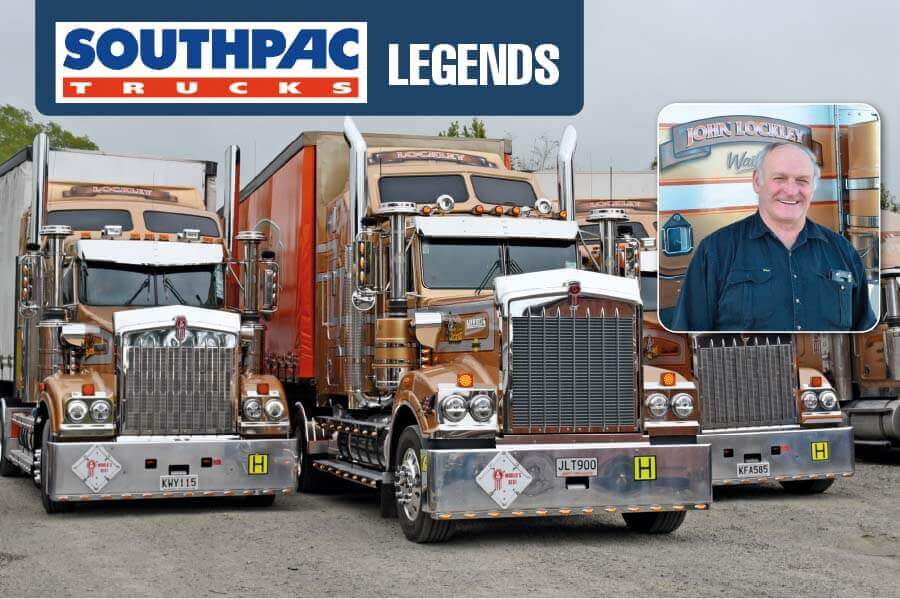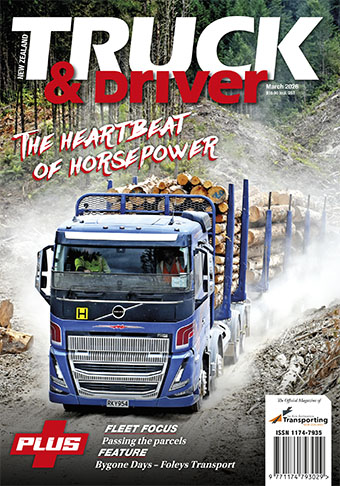Southpac Legends


Gold Star Trucker - John Lockley
Southpac Legends
With his distinctive fleet of gold trucks, the introduction of his identical twin daughters to truck driving and having just ticked over half a century of being in business, not only is 71-year-old John Lockley still out behind the wheel of his Kenworth T900 but retains an unwavering passion for the industry. And for that, he’s a Southpac legend.
Born in Te Aroha on the western fringe of the Kaimai’s, John’s upbringing came with a very rural outlook. His father was a share milker who worked at various locations around the area, and that’s where John says he got his first taste of machinery.
“We lived in Ngarua at one point, and there the old man had me driving a tractor at a very early age. Right then I became machinery mad. I just grew up with it on the farm.”
It’s fair to say that John wasn’t exactly the most academically minded, succinctly saying that he was far from being the top of the class.
“We were the dumbasses at the bottom of the heap, you couldn’t get any lower in the class. But we all worked with our hands and had businesses in the latter days. All the brainy buggers were unemployed - too many brains to do anything.”
When he got to school leaving age (from Matamata College), John took to helping his father out on the farm, but mainly driving the machinery. John went on to driving bulldozers, drain diggers and motor scrapers.
...With his distinctive fleet of gold trucks, the introduction of his identical twin daughters to truck driving and having just ticked over half a century of being in business, not only is 71-year-old John Lockley still out behind the wheel of his Kenworth T900 but retains an unwavering passion for the industry. And for that, he’s a Southpac legend.
Born in Te Aroha on the western fringe of the Kaimai’s, John’s upbringing came with a very rural outlook. His father was a share milker who worked at various locations around the area, and that’s where John says he got his first taste of machinery.
“We lived in Ngarua at one point, and there the old man had me driving a tractor at a very early age. Right then I became machinery mad. I just grew up with it on the farm.”
It’s fair to say that John wasn’t exactly the most academically minded, succinctly saying that he was far from being the top of the class.
“We were the dumbasses at the bottom of the heap, you couldn’t get any lower in the class. But we all worked with our hands and had businesses in the latter days. All the brainy buggers were unemployed - too many brains to do anything.”
When he got to school leaving age (from Matamata College), John took to helping his father out on the farm, but mainly driving the machinery. John went on to driving bulldozers, drain diggers and motor scrapers.
John and Irene married in 1972 and went contract milking for three years followed by three years of 50/50 share milking with his brother. However, it wasn’t too long before John went self-employed and got into agriculture in the Waikato and then Waihi.
This was evidently a busy time for the young 26-year-old, as it was then that he and his fiancé Irene tied the knot and bought a bulk ground spreading business too, and to top things off, a 1113 Mercedes 4x4 bulk spreader with an Automat trailer.
“I was doing agriculture work and then bought the bulk spreading business off Everett brothers and that’s when I ventured out into transport,” says Lockley.
“It was when they deregulated, so we branched out from there. I got my vehicle authority back in 1984.”
Along with the change in business direction came a change of trucks.
“I had a bulk spreader and then I bought a Dodge 6-wheeler because I ventured into doing stock in the late 80s. Then I got rid of the Dodge and bought a brand new 250hp Ford Cargo V8 turbo in ‘88 - tipper and general freight.”
With a guffaw of laughter John adds; “Then being a dumbass, I got into the transport industry properly. You’ve got to be screwed in the head.”
He says that he had a “hankering for freight.” Originally, they were doing just rural and stock work in his own local area, as Garry Edwards was going to concentrate on linehaul. However, John discovered that Edwards started buying stock trucks, so he ventured out into general freight.
“You can’t have too many rural carriers because you end up fighting over nothing.”
Lockley’s business grew when he got into general cartage in the ‘90s and he bought his first linehaul truck in ‘92 - a 8200 Navistar, that came in what would become Lockley’s colours, Las Vegas GOLD. They began by hauling alcohol around the North Island and then picked up a contract with Streamline Freight in ‘95, carting between Auckland to Palmerston and then to Wellington.”
“The Cargo did a little bit every now and again, going up and down to Wellington, it would take all day to get there though. But in saying that, there was just as much tonne on that Ford and a 3-axle trailer as you do today with combinations.”
Aside from its golden trucks, Lockley’s is also known as a family business and rightly so, with his wife and three of his five daughters working there - two of whom (Anna and Amy) are identical twins. He vividly recalls when they started showing interest.
“My twin daughters came up to me when they were about 10-years old and said `can we come and drive for you dad when we’re old enough?’ I said `go and see your mum and grab a pair of overalls.’ They said, ‘what are those for?’ and I told them ‘you’ll find out’.”
John said that he gave them both a grease gun when they came back and told them to go and grease everything under the truck and trailer.
“You’ve got to start at the bottom, and you’ve got to know how to fix them. Because I don’t want you breaking down on the Desert Road not knowing what to do. It’s bloody cold up there in winter.”
From there on in, the twins used to go out with John every chance they could, he says that one would come one day and then swap, ‘they used to do some long hours’. Then they officially joined the business in ‘95, initially in the office and then out driving.
“My daughters started in `98 and Anna has just done her 24th year. Amy started a family four years ago and gave up driving, but she gets a hankering for it every now and again. They’re both good little operators, I can’t beat them, they are so smooth.”
He says that one of his other daughters, Tracey, works in dispatch, and has been beside her mother in the office for the past 15 or so years.
“She’s really good at that job because she can talk to people.”
During the second half of the nineties, Lockley added Marmon’s fleet, with the hand-built North American trucks becoming another thing the business was known for. John carried on with the Navistar and then bought an S Line and then an old ‘originally snow white’ W924. He says that the twins did the main line haul and that he was the back up, ‘so they had the better trucks, and I took the old W’. He says that they’ve still got the W, but it hasn’t really worked since Covid.
The Lockleys have evidently developed a fondness of Kenworth’s as John bought the twins a brand-new Kenworth 409 each for their twenty-year service and he himself has a new SAR Legend on the way.
As with most transport operations, things haven’t exactly been smooth sailing and just over a decade ago, when their fleet had grown to around twelve units, John was diagnosed with prostate cancer. This diagnosis prompted them to scale down, a decision made clearer over the subsequent Christmas period when his wife was in hospital and they were running just a handful of trucks.
“It was really peaceful, so I sold off all the other trucks and just kept the five.”
The cancer did little to deter John’s work ethic and all in all, he says that it only knocked him back a mere couple of days. He was six weeks off the road but was in the workshop for most of the time.
“The boys in the workshop told me to ‘f… off and sit down’. I’d work until I got sore and sit down and I built my strength up. When I went for my final check up with the specialist, I said to my daughter before I left ‘organise me a load’ and I went from the specialist to back on the road.”
He says that he’s also had his fair share of financial dramas. “I’ve been up and down and been broke. The biggest problem has been Auckland, there’s been some that would cut your throat as quick as look at you, and I’ve been shafted for hundreds of thousands of dollars.”
John says that he’s 71 this month and is still driving because ‘I’m a dumbass’.
He laughs as he continues, “if I stay at home the old girl will have me in a grave. She used to always say ‘if you like, you can do this or if you like, you can do that’ I said I don’t f…kin like it and not gonna do it. That was the end of that subject.”
The banter evidently runs both ways as when John recently told his wife Irene ‘in another five years I’ll slow down’, she replied ‘you’re not 80 yet so you’ve got another 9 years to go’.
On a more serious note, John says that the family [not just his] probably gets kicked the hardest from this industry, saying that ‘the old girl, she’s been through hell’.
“Even when I was working locally with fertiliser, I’d leave at 5am and not get home until midnight. So mum was mum and dad to the kids. But in saying that, any argument we’ve had is business or workers.”
There is no real outside of work for ‘mechanical mad’ John, he’s got no other hobbies to speak of ‘just trucks’ and happy in his own space behind the wheel or in the workshop.
“I used to have mechanics when I had a bigger fleet but now I do it all myself, except for any major motor stuff. I think doing it myself really helps, it reduces any downtime and costs off the bottom line.”
He clearly still enjoys the business and industry, saying ‘I wouldn’t be out here if I didn’t’, but adds that he’s still got to work hard and that it’s an industry that you can’t let your guard down.
“Transport is a service industry and if you don’t give good service, you don’t go anywhere. If you don’t look after it, it won’t look after you.”
In terms of the Lockley legacy, things look pretty golden. His daughters are obviously well involved in the business and although they are showing interest, future generations are as yet undecided.
“I don’t know if the grandkids will follow on, but we’ll wait and see.”



 + EQUIPMENT GUIDE - FREE
+ EQUIPMENT GUIDE - FREE
